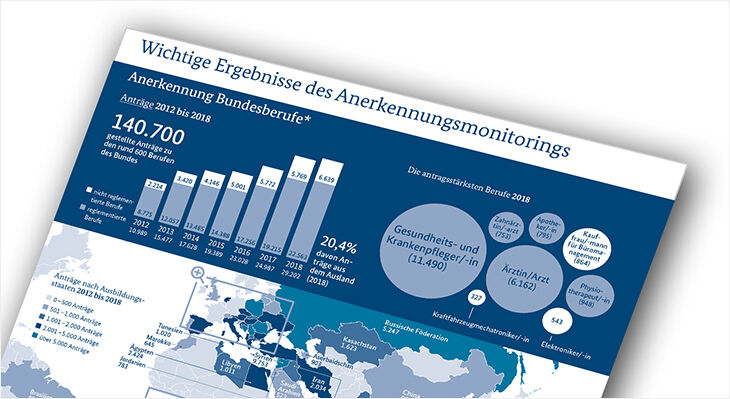2019 Recognition Report approved
The German cabinet has approved the report of the Federal Ministry of Education and Research (BMBF) on the Recognition Act. The report consolidates the findings of the BIBB Recognition Monitoring Project. Almost 280,000 applications have so far been made for the recognition of foreign professional qualifications.

Federal Minister of Education and Research Anja Karliczek explained:
“We are making progress with professional recognition. I am pleased about this as it makes a valuable contribution to attracting skilled workers from abroad. The recognition procedure ensures transparency and quality in the immigration of skilled workers, and greater permeability in the labour market. Since the Recognition Act entered into force in 2012, around 280,000 applications have been submitted for recognition and for certificate assessment. The Recognition Act demonstrates the value we attach to qualifications acquired abroad. As a location for business innovation, Germany is reliant on foreign skilled workers. People are exercising their rights to a recognition procedure—and often with success: Over the past year, around half of foreign vocational qualifications were recognised as fully equivalent when compared with the “comparable occupation” in Germany.
Over recent years, the Federal Government has made ongoing improvements to the general conditions for recognition. We want to continue on this path. We shall further develop the central information platform ‘Recognition in Germany’ and also extend financial support through the recognition grant. For skilled workers abroad interested in coming to Germany, we are creating a central point of contact—the Central Service Centre for Vocational Recognition. Together with the federal states, we aim to make the recognition procedure even more transparent and faster.
The new recognition report shows that the vocational recognition procedure is improving career options. With full recognition, salary rises by an average of €860 per month. Because recognition pays off, interest from applicants is understandably high. It also ensures quality in terms of skilled immigration. This means that the Recognition Act ensures a win-win situation in the truest sense”.
Background
The 2019 Report on Recognition is the result of the statutory monitoring of the Recognition Act. This is conducted by the Federal Institute for Vocational Education and Training (BIBB) on behalf of the Federal Ministry of Education and Research (BMBF). The Report on Recognition provides information about the latest developments concerning recognition in Germany.
The recognition procedure checks whether a foreign vocational qualification is equivalent to the respective German reference occupation. From 2012 to 2018, official statistics recorded a total of around 140,700 applications for recognition of occupations regulated at federal level alone, this included approximately three-quarters in the regulated sector (in particular general nurse and medical practitioner) and one quarter in the non-regulated sector. In 2018, around 29,200 equivalence checks were applied for in occupations which fall under federal competence (an increase of 16.8% compared to the previous year).
In 52.5% of completed procedures in occupations regulated at federal level, notification of full equivalence was issued in 2018. No equivalence was the outcome of only 2.3 percent of procedures. More than two thirds (69.4 percent) of applications submitted in 2018 related to a professional or vocational qualification acquired in a third country. The main states here were Syria (3,177 applications), Bosnia and Herzegovina (2,880 applications) and Serbia (2,472 applications).
The expected rise in demand for professional recognition from skilled workers from third countries will pose a particular source of new challenges for the competent bodies. This will make the issue of having sufficient human resources to process applications even more important in future. Questions as to how knowledge can be shared even better and how necessary cooperation agreements and networking can be further deepened within the scope of the recognition procedure will also take on greater significance.
(Source: Translation of the BMBF press release of 11.12.2019)